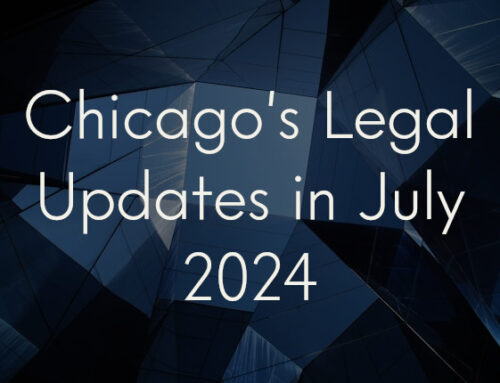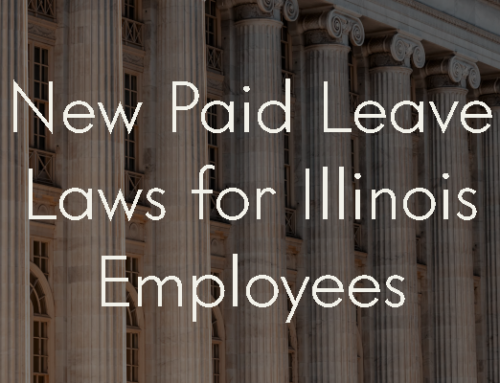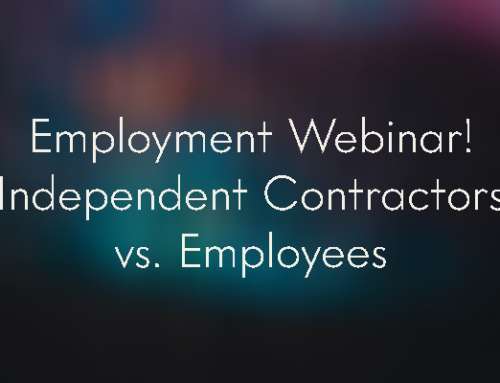New year, new laws! In our 2025 annual legislative digest for Illinois’ small business community, we highlight seven new developments. Please note: This post covers only some of the new legislation taking effect this year and, while these laws certainly affect small businesses, there may be others as well. These laws make the following changes:
- The FTC’s battle to non-compete ban develops.
- Illinois updates how it regulates the collection of biometric information, like fingerprint and face scans.
- The state expands civil rights protections for reproductive decisions and family responsibilities.
- The state expanded protection for minors in the workforce.
- Employers must observe new requirements for job posts and providing pay stubs.
- Employers face new limitations on “captive audience” meetings.
The FTC’s Non-Compete Ban
When the Federal Trade Commission (FTC) announced in April that they would be banning non-compete agreements across the nation, we thought it would be a bigger story. It would be a landmark change in the national employment scene – but it didn’t play out as the FTC expected. A lawsuit in the Fifth Circuit Court resulted in injunctions blocking the ban from taking effect. The FTC filed appeals in both cases, so the ban may still go through, but it’s stalled as of the time of this writing.
Changes to the Biometric Information Privacy Act
In May of this year, lawmakers approved a bill restructuring penalties under the Biometric Information Privacy Act (BIPA). Governor Pritzker signed the changes into law on August 2nd, 2024.
The Act originally treated each individual collection of biometric information (e.g. fingerprint and facial scans, etc.) as discrete violations if done in violation of the act (i.e. without proper consent or policies for storage and protection). If a worker scanned in a dozen times a day, the employer would rack up a dozen violations for just that worker on just that day. Account for an entire workforce, and things get very expensive very fast.
After this year’s changes, employers are only to be held liable for the first instance of such collection done in breach of the act, which limits the amount of damages an employer can have to pay. Being in breach of BIPA is still very serious, but less crippling to small businesses than it was before.
Changes to The Illinois Equal Pay Act
Starting on January 1st, 2025, employers in Illinois will have a few more considerations to observe when posting for new jobs. Amendments to the Illinois Equal Pay Act will require that employers with 15 or more employees disclose the following details in every public job posting:
- Wage or salary, or wage or salary range.
Summary of benefits and other compensation (bonuses, stock options, etc.). The Illinois Department of Labor (IDOL) is still formulating rules on these specific requirements. In addition, employers will be required to inform current employees of all opportunities for promotion within 14 calendar days after posting the same position externally. They must also retain records of every job posting, pay scale for each position, promotional opportunities, pay determinations, and related information for 5 years.
Changes to the Illinois Human Rights Act
But that’s not the only update for Illinois employers. Updates to the Illinois Human Rights Act improve worker protections, meaning that their bosses need to be more careful.
- It prohibits discrimination based on reproductive health decisions, defined as “a person’s decisions regarding the person’s use of contraception; fertility or sterilization care; assisted reproductive technologies; miscarriage management care; healthcare related to the continuation or termination of pregnancy; or prenatal, intranatal, or postnatal care.”
- It extends the window to file a complaint about employment discrimination, harassment, or retaliation with the Illinois Department of Human Rights to two years after the violation (extended from 300 calendar days).
- It allows a civil penalty for “each instance” of a civil rights violation.
- It prohibits employers from discriminating based on “family responsibilities”, defined as an employee’s provision of personal care to a family member. Examples include activities to cover a family member’s medical, nutritional, hygienic, or safety needs; transportation to medical appointments; being physically present for emotional support during inpatient or home care; etc.
- It prohibits employers from making employment decisions based on assumptions or stereotypes about how employees would conduct themselves because of membership in a protected class.
- It prohibits employers from using artificial intelligence (AI) to discriminate in connection with employment decisions, and it requires them to notify employees when they use AI for employment-related purposes.
- It increases the penalties that can be levied against employers for violations.
- It does NOT require the employer to amend their employment policies for leave, scheduling, etc.
These changes take effect on January 1st, 2025.
Child Labor Law of 2024
Won’t somebody think of the children! This year, Illinois did. The Child Labor Law of 2024 radically changed how minors under the age of 16 will be employed in our state, beginning on January 1st, 2025. They include:
- Employers must get a certificate authorizing a particular minor’s work, which the minor must submit to their school’s issuing officer (i.e. superintendent) and parent or guardian for approval.
- Employers must maintain detailed personnel records for the minor.
- It restricts the number of hours minors can work per week while school is in session, is out of session, and on holidays.
- It prohibits minors from working in certain industries, in addition to those found in the Federal Labor Standards Act (FLSA). Examples include factory work, construction work, meat packing, any job in which they would handle alcohol, etc.
- It does carve out some exceptions, such as for certain positions in the performing arts for certain parts of the act including work hours.
- Penalties range from $500 (for failing to post the requirements of this Act) to $60,000 (if a minor dies while working in violation of this Act).
This isn’t a comprehensive list of what the Act enacts. We recommend getting an attorney’s guidance to make sure you’re compliant if you intend to employ minors under age 16.
Changes to the Illinois Whistleblower Act
Starting on January 1st, 2025, updates to the Illinois Whistleblower Act will provide further employee protections. Employers will be prohibited from retaliating against employees for disclosing or threatening to disclose information related to employer activities, policies, or practices that they in good faith believe violate state or federal laws, rules, or regulations, or pose a danger to employees or public health or safety.
Changes to the Illinois Wage Payment and Collection Act
Starting on January 1st, 2025, the Illinois Wage Payment and Collection Act (IWPCA) will require that:
- Employers give their employees electronic or hardcopy pay stubs, defined as an “itemized statement reflecting an employee’s hours worked, rate of pay, overtime pay and overtime hours worked, gross wages earned, deductions made from the employee’s wages, and the total of wages and deductions year to date.”
- Employers keep copies of pay stubs for at least three years from the payment date, regardless of the employee’s employment status during that period.
- Employers provide copies of pay stubs to their employees on request within 21 calendar days in their employee’s desired format (electronic or hardcopy). Employers may require employees to submit such requests in writing.
- After an employee’s employment ends, employers must offer to provide them with a record of the employee’s pay stubs from the year before their final pay period. Employers are required to make this offer if they furnish pay stubs electronically and if the departing employee cannot access pay stubs for at least one year after their separation. After the employer makes this offer, they must document the date and how the employee responded.
- Penalties for failure to comply with these changes can be up to $500 per instance.
Limits on “captive audience” meetings
Illinois’ new Worker Freedom of Speech Act regulates “captive audience” meetings. These are employer-sponsored meetings to communicate political or religious matters, commonly to dissuade their workforce from joining a union. The Act prohibits employers from threatening adverse action as an inducement to attend such a meeting, or from retaliating against their employees for not attending the meeting or for making a good faith report of a violation or a suspected violation of this Act.
This Act will take effect on January 1st, 2025.
What should my business do to prepare for these new laws?
Of course, we want to leave you with some action items!
- Most of these updates pertain to employment policies. As such, make sure your employment policies get adjusted for the new worker protections. Not sure where to start? Get in touch and we can help.
- Sign up for our newsletter for future updates.
- Follow us on Facebook and LinkedIn to stay informed about changes in the law as they take effect.
- Seriously, sign up for our newsletter and follow us on Facebook and LinkedIn. If the FTC’s non-compete ban sticks, it will cause a sea change in employment law nationwide. Stay tuned to those outlets for more updates!
So here’s to 2025! It’ll be here before we know it. Let’s make it a good one.





